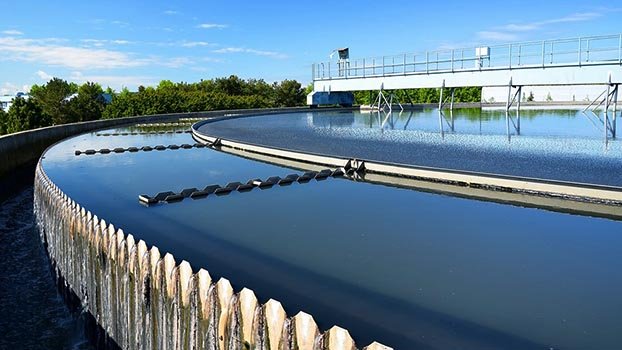No more water crisis in Dhaka city
Adequate supply from Padma plant

The Padma Water Treatment Plant, which was supposed to meet all the water supply demands for millions of Dhaka city dwellers, has recently started supplying water. The plant has a capacity of supplying more than 45 crore litres of water per day, which substantially removes the existing water crisis problem.
A senior official of Dhaka Water Supply and Sewerage Authority or DWASA told Bangladesh Post that the first phase of the surface water treatment plant is a part of the 2009 master plan, which predicted yearly demand of water in the capital. Taqsem A Khan, Managing Director of DWASA told this correspondent, “We had assessed the total water consumption need in the capital and based on that we had predicted that by 2021 Dhaka inhabitants would require additional 45 crore litres of water per day. Construction of the first phase of the plant was completed accordingly.”
He also said that as per the master plan, DWASA will construct a second plant (part of the second phase) to treat Padma water by 2030 which would keep pace with the growing demands for water in the capital then. In addition to the Padma surface water treatment, two more major river water treatment plants having capacities to supply over 65 crore litres of fresh water per day treated from Meghna and Dhaleshwari rivers would be commissioned in the near future.
Dhaka Water Supply and Sewerage Authority or DWASA officials while sharing information with Bangladesh Post disclosed that the city would be free of water crisis with the addition of the major water treatment plant. Currently there is no crisis of water in Dhaka city as city dwellers have started getting fresh water from the newly functioning Padma Water Treatment Plant located at Jashaldia of Louhajang upazila in Mushiganj, officials concerned said.
Taqsem also said that the Padma water treatment plant currently produces huge amount of excess water per day. Such production of extra water would come in benefit during the summer when demands for water substantially increase. Contacted, Project Director of the plant, Rafiqul Islam told Bangladesh Post, “We have completed the first phase of Padma Water Treatment Plant. The city dwellers have started enjoying uninterrupted water supply from this plant since October last year.”
“Once the project is fully implemented, WASA can provide about 45 crore litres fresh water will meet about 40 percent demands of the residents of Dhaka,” he added. Dhaka WASA is now supplying a total of 255 crore litres of water per day from river water treatment plants and 928 deep tubewells, against the daily demands of 225 to 255 crore litres, DWASA sources said.
While visiting different areas including Rampura, Khilgoan, Basabo, Mugdha, Farmgate, Mirpur, Sadarght, Dholaikhal, Uttara, Banani, Mohammadpur and Dhanmondi, this correspondent found no crisis of water as people expressed satisfaction over the recent water supply from DWASA.
Taposhi Dhar, 40, a resident of Tejkunipara in Farmgate, said, “The crisis of water has now reduced to a great extent. There is no water crisis in our area now. Earlier, the water supplied by DWASA had pungent smells, but, the water is now fresh and drinkable.”
Anwar Hossain from Rampura, Mahbub Hasan from Mugda, Ariful Isalm a from Mirpur-10, Saifur Rahman from Shewrapara, Ariyan Robin from Mirpur-1, Ayesah Hossain from Old Dhaka have recently commented the same on the piped-line water supplied by DWASA.
Local Government, Rural Development and Cooperative Minister Tajul Islam on Thursday also said there is no shortage of water in two city corporations’ areas in Dhaka. “The supply of water is more than the current demand. Dhaka WASA is supplying 255 crore litres water per day against the daily demand of 225 to 255 crore litres,” the minister said this in a written reply to Awami League member Benazir Ahmed during a question-and-answer session at the Jatiya Sangsad.
Besides, considering the growing demand of water, the government has undertaken Gandhapur Water Treatment Plant at Rupganj in Narayanganj under Dhaka Environmentally Sustainable Water plant project at the cost of Tk 5,600 crore. Sources said, once the project completes, the city people will get 50 crore litres more fresh water per day from the river Meghna.
The project will be funded by the Asian Development Bank, the French Development Agency, the European Investment Bank and the Bangladesh government. Apart from this, on October 2019, Prime Minister Sheikh Hasina inaugurated the first phase of Well Field Construction Project at Tetuljhora-Bhakurta in Savar upazila which will produce 15 crore litres of water daily. It has been known that the construction of Padma Water Treatment Plant project is being implemented at a cost of Taka 3,451 crore.
Water from the Padma River has been treated at the plant and then it has been sent to Dhaka city through a pipeline system.
Of the total water supply from DWASA, 22 per cent water comes from surface sources and 78 percent from ground water. WASA sources said that if all these projects once implements, the dependency of ground water will reduce to a great extent and there will be no water crisis in Dhaka as well.
On 8 October 2013, Padma Water Treatment Project was approved at a meeting of Executive Committee of the National Economic Council (ECNEC). Although the project was said to complete by December 2016, it was delayed due to various complexities.



